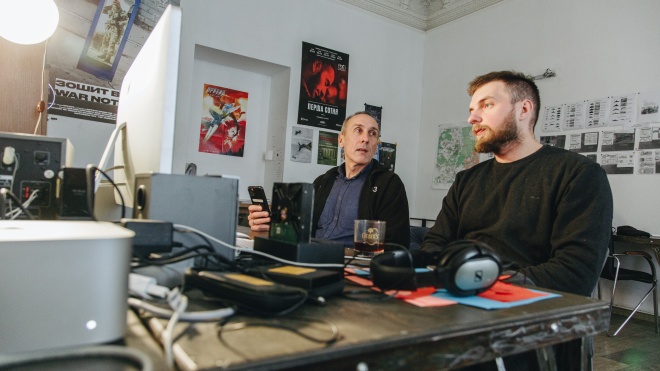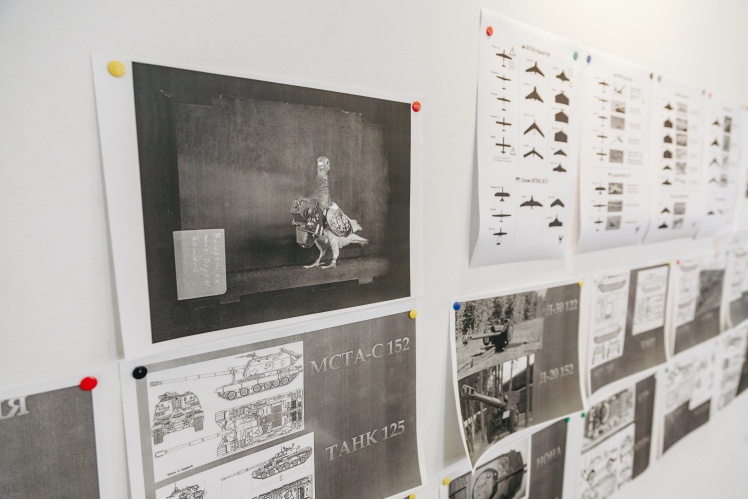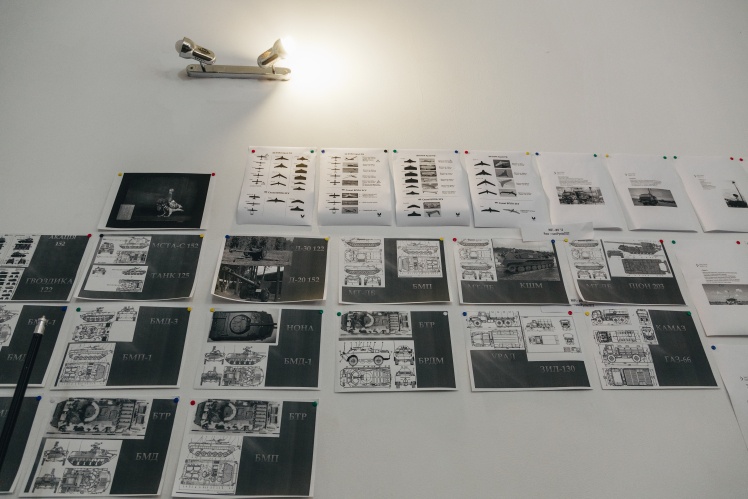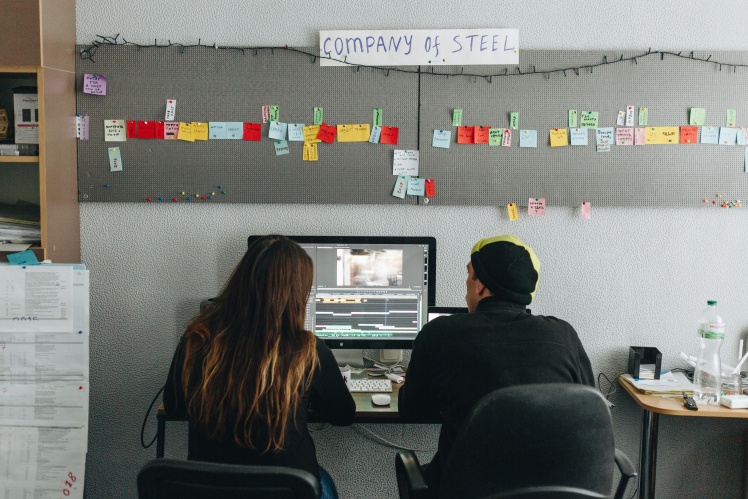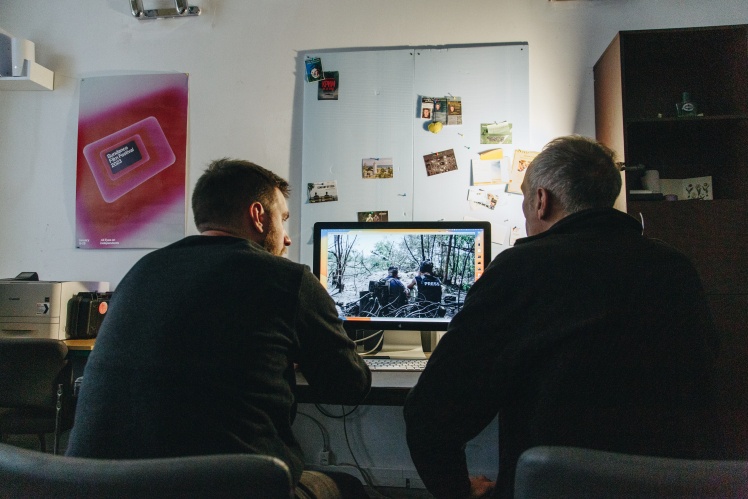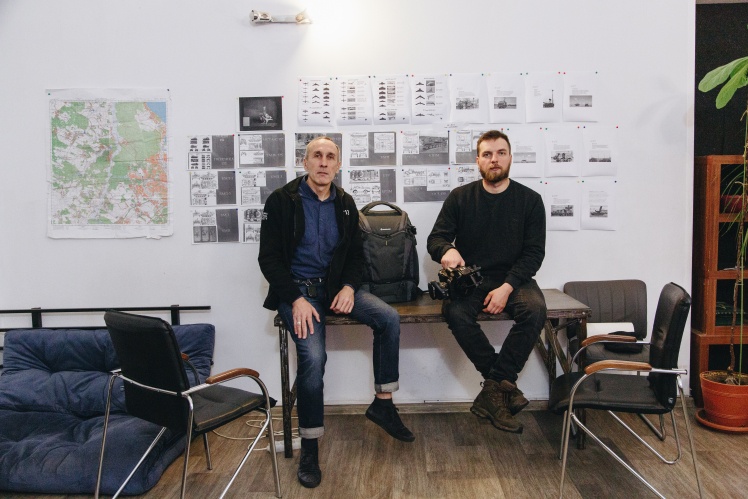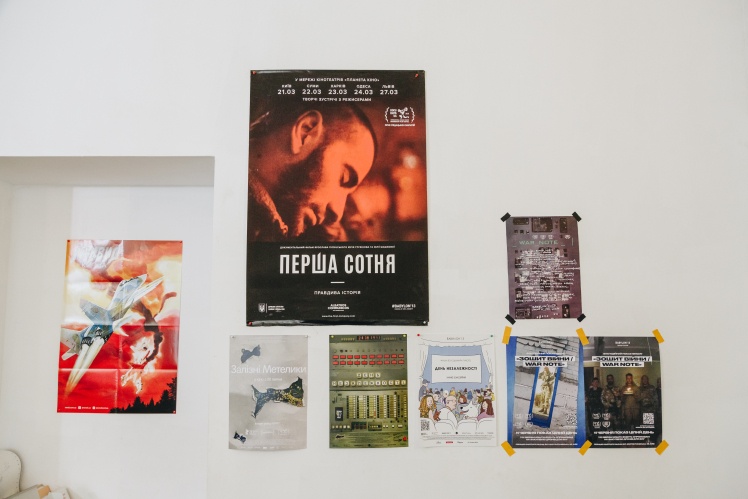Letʼs start with the main thing. How to make a documentary film about war?
Kotlyar: There are different directions in documentary cinema. Some people think that if you lower your camera and stop filming during some events, then you are a bad documentarian. But I perceive everything through the prism of what is happening in my country. Since 2014, our foreign colleagues have accused us of not having a zero point of view. But they come to, letʼs say, Zanzibar and shoot rebels they donʼt care about. They are out of context, they are just filming about human suffering.
But I was always far from that. Because I am a citizen of my country, all of us at Babylonʼ13 are activists in some sense. I have never looked for a zero point of view since the Maidan. That is, we have always communicated our point of view and position to the viewer through it. Is it correct or not? There is no clear answer. But yes, I didnʼt interview the other side because the other side would have killed me.
What is the main ethical rule here?
Kotlyar: In my work, as a cameraman, director or producer, I am always guided by the basic rule that my work should not injure the people I filmed. That is, she should not bring them even more pain. There are people who are ready to talk about their trauma, to share what they went through. And itʼs actually therapeutic for them to just talk on camera. As a cinematographer, you feel it immediately.
There are colleagues who try to squeeze out a tear. I always tell one episode that happened to me in Lviv. From the second week of full-scale invasion, part of our office moved to Lviv, because we had to save the material and set up work. We filmed the displaced persons in the theater, which was a shelter and a home for people from Kharkiv and the region. And a journalist from Czechia interviewed a boy. She was just trying to squeeze a tear out of him. She asked: "Did you see the blood, son?". And that "son" is just nine years old. "Were you scared when you were left under fire?" I translate this and look at her. Of course, the child was scared.
In drama, in storytelling, there are a huge number of tools for telling a dramatic story, for engaging the audience to empathize, while not delving into this war porn like "here a cat eats a corpse." We rarely film funerals. And when we do, we try to do it from the side as much as possible. I feel physically ill when I see how some colleagues climb into the coffin with a 16 mm lens set so that everything can be seen. I think you have to stay human. Most people from Babylonʼ13 have this kind of approach.
Andriy Kotlyar
Dmytro Vaga / "Babel"
And what should be done?
Kotlyar: With a sense of tolerance for people and their grief. And itʼs not just grief to look for. But, for example, the sincere heroism of Ukrainians. When you come to the military at their post in the trenches, there is no grief at all. There is a great team feeling, everyone is super positive. Of course, behind the scenes there is also grief. When a medical company tells you that their women came to serve after their husbands or brothers died. A lot of people joined the Ukrainian army this year or at the end of last year, after losing loved ones. And you understand that behind all their jokes there is a tragedy.
But you can communicate in different ways. It seems strange to me when a documentarian leaves behind a person in a depressed state, but has a great text, material and pictures. It is necessary to approach slowly, empathetically. There are people who are ready to open up to you, ready to talk to you. And thatʼs okay. There are people who will have a defensive reaction. And you understand that you need to spend another five days with them so that they start to trust you.
You begin to talk about documentary cinema in the form of a small lecture. That we are Babylonʼ13, we have ten years behind us. That this is not an entertainment show, and our movie will not be released tomorrow, and in a week either. Sometimes it can be released after five years. But it has to be filmed. We currently have a small project "Gluttony War" — a symbiosis of poetry and prose of the Ukrainian military and our documentary material. Soon there will be several expeditions where we simply observe the life of the military. This is a completely unique chronicle.
You just need to win the trust of the heroes and take your time to pick up the camera. I never rush, Iʼd rather sit with them for a few hours, drink coffee, and talk.
Even if there is an interesting conversation that should be filmed?
Kotlyar: Yes, of course. This is my approach. Iʼll wait, Iʼll tell then who I am, what I did. I ask, maybe I have something in common with one of the heroes: maybe someone is from Poltava region too or maybe someone practices jiu-jitsu, just like me. And then it somehow goes by itself.
How does documentary differ from journalism?
Kotlyar: Itʼs just about different things. Journalism has one task — speed, informativeness, clear points of view and presentation of material to the widest possible circle so that your text is read. Documentary, at least ours, is more about the emotional component, about things that are difficult to verbalize. For example, about the collective trauma of Ukrainians, what is the feeling of losing loved ones, what is brotherhood in the broadest sense of the word.
Documentary for me is deeper. Few people will read a 90-minute text. And our films sometimes last that long. We can tell the story of the war crime in this timeline. For example, we made a film about MH17 — "Iron Butterflies". About the fact that Russia shot down a plane over Ukraine, and what it did in the years after that. How it built propaganda around this case in 2014, 2015, 2017, how it tried to influence the world, lobbied for its agenda all these years, devalued everything that Ukraine said. I have read a huge amount of articles on this matter and this is certainly interesting. But these are fragments. And documentarians have latitude when we put everything together.
Volodymyr Tykhyi and Andriy Kotlyar
Dmytro Vaga / "Babel"
Tykhyi: I once said to a cameraman: "You are the only one who shoots like that, you have a unique experience. And if you donʼt shoot a spider crawling on a bulletproof vest now, no one will shoot it. There will be tons of technical videos. But there will be no sense of time, your sense of the moment and reality." The work of a documentarian is a statement, he must adhere to his artistic and aesthetic manifesto.
Documentary, on the one hand, films the here and now: for example, crimes, exploits the dramatic or even tragic circumstances of what is happening. But on the other hand, this is a story about a person, about his or her pain, about hopes, about something eternal. This is a subjective view. And its value lies precisely in the fact that the person who does it represents this emotional impressions, this personal experience.
Kotlyar: But where the power of journalism is in, for example, cases of Bucha or Izyum. It was right to let everyone there, not only Ukrainians, but also Americans, French, Poles, everyone. So that Biden, Macron and other world politicians were simply forced to comment on these stories. It turned out that the case is not that these "obsessed Ukrainians" imagine they were being shot for the Ukrainian flag. They were actually shot for it.
That is why I am always against closing the access to the front. There are, of course, security issues, places where journalists should not be allowed, military operations. But locking everything up is a wrong approach. We need hundreds of journalists from major media outlets to be here, 24/7.
And sometimes journalism turns into documentary. For example, "20 days in Mariupol". These are journalists who had an absolutely journalistic focus and task, but found themselves in terrible conditions. And they understood their mission: that they should tell the whole world about the total destruction of the city. And only they have this opportunity.
But usually a journalist and a documentarian do completely parallel things. And Ukraine needs them both.
The military probably donʼt always notice the difference between documentarians and journalists. Some people have arrived, they are filming, disturbing soldiers.
Kotlyar: Of course. They only notice the difference when you spend more time with them. And journalists usually donʼt have this time. Press officers often take us in joint groups. And journalists always have their own story — they have to visit four positions in a day, and have an hour for each. Take portraits, talk to the commander, find someone young, then an older one, a woman and so on. And we can watch someone for two years. There are people with whom we build relationships for years, we have more time to earn trust.
Tykhyi: With us, Yuliia Hontaruk is still working on the film she started filming in 2015. In fact, even in 2014, but systematically since 2015. Itʼs about "Azov", about fighters, about their path. And itʼs normal for a documentarian.
Volodymyr Tykhyi
Dmytro Vaga / "Babel"
Should a feature film about war be shot during the war?
Kotlyar: Depends on who is doing it. If this is Valentyn Vasyanovych, then I have no questions. I understand his level of artistic perception of reality, his professionalism, he represented Ukraine at the Venice Film Festival and so on.
But it shocks me when people who havenʼt had any relevant experience, havenʼt worked with the topic of war, with the topic of trauma do this. They made serials for the Russian market for many years. And here — bang! They decided that they could shoot a movie about war crimes.
Itʼs weird. Because when you just made a bad comedy or romantic series, you didnʼt really hurt anyone anyway. If you did a great job, you will receive a higher fee on the next project. If you did it badly — well, okay. But people donʼt realize that behind the stories of war crimes are the traumas, the lives of people who were killed and raped in these locations.
I went to a panel discussion to listen to the authors of the film about Bucha. Their position shocked me. Of course, we will not go to their film set to cut cables, because after all, we live in a democratic country.
But you can publicly criticize.
Kotlyar: Yes. We, as filmmakers, as people who have been working with this topic for ten years, have to express our position. Guys, you should think a hundred times what you are doing. With your film, for which you have neither expertise nor experience, you can harm people and the reputation of the country. I am afraid that Ukraine will start filming its "Opolchenochka". Of course, our cinema is also a kind of counter-propaganda, but the artistic level is important.
After all, a feature movie about war can be made later.
Kotlyar: Generally, yes. But documentarians cannot afford this. They have to film now, because it wonʼt happen later.
Theoretically, if you were offered to go to Mariupol now and the occupiers promise safety, would you go?
Kotlyar: No, never in my life. Even if Joseph Biden personally confirmed to me that we are coming in with a unit of marines, they stay there and start liberating the land, still no.
Such proposals were made to our documentarians. Not now, of course, but in 2015-2016. We refused. For this, there are foreigners from large news agencies who do not position this war as their personal tragedy. If a conventional German, for example, goes to film such a thing, then, it can be OK. Although I will still not drink coffee with such a German, because you go through all these filtration posts, there is their propaganda, and you show you everything they want to show for a reason.
Some foreign colleagues do this. Our war is not the first one where itʼs like this. In Iraq, in Afghanistan, everywhere there were people who filmed from two sides. But I hope that colleagues in Ukraine will have the sense not to go for it, not to accept such proposals, because we know how any agreements with Russia end. I will go to Mariupol only when itʼs liberated. Just to film things that should remain in history — mass burials, the state of the city.
Dmytro Vaga / "Babel"
And, for example, will you film pro-Russian Ukrainian civilians if you come across them somewhere in a front-line town?
Kotlyar: Yes, of course. I will not stay at their house to sleep, of course. But in general yes. We also have a scene in "Iron Butterflies" where civilians rejoice at the downing of a Ukrainian cargo plane. I am for an honest dialogue with society. For me, a remarkable experience in 2014 was a trip with Denys Bloshchinsky and his initiative "From the country to Ukraine" to Donetsk and Luhansk regions. Sometimes there were more Ukrainian speakers in a village in the Donetsk region than in a village in the Kyiv region. And sometimes we had to hear that gays, Nazis, and Jews seized power. By the way, I heard much less about Bandera there than about "Poroshenko is actually Waltzman" or Zelenskyʼs Jewishness. Therefore, it is not clear who actually advocates Nazism in our country.
At the same time, in 2014, Ukrainian bands were brought to Lysychansk and held a concert. A woman aged 55-60 approached them and said: "Thank you for bringing us such a concert. This is the second time in my life that I am at a concert. But, of course, the first concert was cooler. It was in 2008, when Novinsky brought us "VIA Gra". And I understand the context in which people live. There was one concert six years ago and one now. And thatʼs all.
Or you meet someone who talks about “the mighty USSR”. And then you realize that a person worked for 30 years at some factory that no longer exists. And he is nostalgic for his youth, when he was socially justified and understood his place in society. There are different cases, different people and different motivations. And we can show these people. But there are things I wouldnʼt shoot anyway. Because I would have to overpower myself.
Like what?
Kotlyar: We spent a lot of time in Mykolaiv last summer. It was then a front-line city, and in such cities, everyone always hangs out near cafes — journalists, fixers, documentarians. And exchange information. Journalists come, tell us that there is such a story, that we just have to go and film right now. There is a village beyond Mykolaiv, the last one before Russian positions. There is a family in the village that refuses to evacuate. They are alcoholics. They have two children, eight and ten years old, very bright children. And they have nothing, just water in the well, chickens, dogs and thatʼs it. Total poverty.
I can understand why the wannabe journalists at The Washington Post would want to make this story. The drama of children who are impoverished because of the war is well understood by everyone. And the social construct is not new either, there is enough of things like that in all countries. But I personally am not interested in telling such a story. Because this is my country, which, unfortunately, turned out to be weak in this regard. Somewhere we were strong, but in terms of social policy, we simply have a total collapse, especially in the east and south.
Shall we talk about it? I will not. This is the job for journalists. Write, get social services to finally do something and take responsibility.
Has it ever happened that the characters of the film later asked not to show them?
Kotlyar: This should be discussed. In global practice, if we talk about the sale of a film on VOD platforms, you have to sign an agreement on the publication of personal information with everyone. We are also trying to do that now. Because if not, then there is always a small probability that you will bury your movie, in which you have invested several years of your life.
We had a story when we had to blur the in Volodyaʼs film "Day of the Ukrainian Volunteer". There were marauders who were tied to poles. And the BBC asked that the face be obscured, because the person may then file a lawsuit. I still know about international cases where this was a big problem. When people filed lawsuits due to the publication of personal data. And the films simply disappeared.
Tykhyi: It happens that the characters do not like the film. Often this means that the director did something wrong when working with the characters. These relationships must be built. You can first make a small film, put it on YouTube, let several thousand people watch it, let the key persons from it see themselves, see the context, see what is happening around and where they are in this context. Let there be a certain discovery of themselves in a new capacity for them. And then it will no longer be a surprise for them that they saw themselves somehow differently than they are seen by others.
Volodymyr Tykhyi
Dmytro Vaga / "Babel"
Do you perceive your work as part of propaganda? Not state-centralized, but in a broader sense.
Kotlyar: I perceive my work as an effort to help my country. There is grant cooperation where, for example, we agree on heroes [with those who provide us funds]. But it never happened that someone could tell me to go and film something. Neither to me nor to my colleagues. The artist does not receive a specific order, he or she has own view. Can our cinema be an element of Ukrainian propaganda? In the broadest sense of the word, of course. Because there is a Ukrainian agenda there. A clearly articulated pro-Ukrainian position. But we donʼt do anything by some demands from other actors, because itʼs just not natural. We do things that come naturally to us.
Tykhyi: There are a lot of different things coming up right now. For example, people from Korea write that they want to make Korean subtitles for the film and popularize it in their country. A Ukrainian film festival will be held somewhere in Berlin. But this cannot yet be called propaganda. But it cannot be called enlightenment. This is such a manifestation of "we are". The word "propaganda" does not exist in Ukraine, unfortunately or fortunately. There are political manipulations, there are some tactical jokes, some scandals. But the strategic story of all this is just being born.
Should Ukraine have its own propaganda at all?
Kotlyar: Ukraine should have an agenda. The "Joint telethon" as a tool for shaping this agenda has long since exhausted itself. And I believe that it should be abandoned urgently. It is necessary to switch to grant support of independent media. Which, of course, are in a terrible situation, because there are no advertising budgets, there are no sales.
It can be grant support for specific projects. And the telethon practice should be avoided. Because we will simply kill journalism. Because subsidized channels donʼt have the need to develop.
And if you were offered to make a new film at the expense of, for example, the Ministry of Culture, but on their terms, would you agree?
Kotlyar: I will say this: the conditions cannot apply to editing and meanings in the film. Or, for example, there cannot be a condition to film some "independent politician". The conditions can be related to release date, release location, whether to invite the president, or to hurry up and release this movie for Independence Day. This can be allowed.
But this is purely theoretical. Not in the context of our situation with the State Cinema Agency and the Ministry of Culture, because we do not communicate, those bridges have been blown up a long time ago.
Tykhyi: The artist ideally has an internal empire, completely independent from the world, even from his relatives. This allows you to think and work strategically. The state, funds and all others turn to you when you are needed. If your work is needed not only by you, but also by the state, thatʼs great, but you have to remember that itʼs short-lived.
I see a poster with the Ghost of Kyiv on the wall. A legitimate question: to what extent can a documentarian be a mythmaker?
Kotlyar: We are mythmakers. I want to see myself as a mythmaker. How does this relate to the fact that the film is documentary, that is, it should reflect reality, and myth is something surreal? Ukrainians have a historically formed request to mythologize things. "Cyborgs" of Donetsk Airport, "Heavenly Hundred", the image of a volunteer in 2014, the image of a volunteer in 2022, Ghost of Kyiv. And it is obvious that all these things are built on the true heroism of the military. These are not fictions. Ghost of Kyiv is cool.
Dmytro Vaga / "Babel"
And doesnʼt this make documentary a little game-like?
Kotlyar: I like that there is a collective image of the Ukrainian pilot. At the beginning of a full-scale invasion, the Air Force of the Ukrainian Armed Forces was given 48 hours to survive. And they heroically made it so that rockets are still flying at the headquarters of the Black Sea Fleet, ships are burning and will continue to do so. This is absolute heroism, which first crystallized into the image of the Ghost of Kyiv, and now it is the collective image of the Ukrainian pilot. You can work with this in a feature film, and you can also in a documentary film.
Tykhyi: A documentary filmmaker must create archetypal images. Now the search for aesthetics is going on, which in one way or another should crown this stage of Ukraineʼs existence. We are not just building a cultural space adequate to the events, we have only just begun to build it. Three or four years ago, we still had a common cultural space with Russia. And now we need aestheticization and development of archetypes of people who exist in these difficult circumstances.
Now a dangerous topic. Is cooperation with Russian documentarians possible?
Kotlyar: No, itʼs impossible. Fuck them. Completely, irrevocably. I know there are Ukrainian colleagues with different views. Apparently, a discussion about this is generally possible. But there can be no cooperation. In one of the projects, we now had the opportunity to shoot footage on the territory of Russia, it was possible to order it. But we donʼt even consider such things.
Tykhyi: We must avoid the Russians in our domestic context. Because as soon as they appear, this context becomes Russian. To keep, not to let go, in all spheres — documentarians, musicians, writers. Regarding the external international context, we canʼt do anything here. Russia is part of the global cultural context, and there is no way to escape it. And Ukraine is still small in the world context, we are just beginning to integrate there.
Is it possible to participate in some international festivals with Russians?
Kotlyar: We must participate. Because where we are not, they will be. But you donʼt need to shake hands with them. In 2022, at Sundance, they tried very hard to introduce and befriend us with the team of the "Navalny" film. And with Navalnyʼs family. That was... aggressive. This was not done by the festival team — just by audience that is always around big festivals. There are constant requests to do a panel discussion. Like, you and independent filmmaker from Russia who lives in the United States. And I always answer: what should I talk to him about?
Andriy Kotlyar
Dmytro Vaga / "Babel"
Tykhyi: Ukrainian documentary films should be presented at the same festivals as Russian ones. Now there are often maneuvers — the Russians came somewhere, the Ukrainians left. But we will make it only with maneuvers. Because we will get tired of this maneuvering and die on the way. And they will not get tired, they will come to our place and tell us that the Ukrainians, damn, they were good, but you see, they did not bear this burden [of telling the trugh], so now we will bear it.
For example, there was a situation in Cannes in 2022, when our young cinematographers spilled paint there — the action was against the presence of Russians. But the organizers decided that war is war, and this is education, and spilling paint isnʼt aesthetic. And because of this, according to certain rumors, Maryna Vroda could not show her film in Cannes in 2023. Although this is absurd, because she is a laureate of Cannes, the film is interesting, it should be at the festival. And they did not take him as a punishment for Ukraine. These are rumours, but I believe them. And we have to think about how to always be present in this space. Because the Russians will not give us anything just like that. And they will not move so that we too get a place under the sun.
And as for the writers who go to the discussion with the Russians.
Kotlyar: I read the story of Andriy Kurkov and Masha Gessen. It seems to me that the particular case of Gessen is much more complicated than most. Because they are not perceived as Russian. They are still part of the cultural space of the USA.
They have American citizenship.
Kotlyar: Citizenship, yes, all these things. But personally I would not go [to the discussion with her]. Because you just give Russians another reason to say that "oh, well, itʼs not like that, Tarkovsky, Dostoevsky, and we are against war in general, Putin started the war."
We support the Russians who are fighting for Ukraine. These are people who deserve respect because they have taken up arms and are fighting on the side of good. And there is an audience that went to Berlin and Paris. So-called Russian artists in exile. And you understand that, in the end, they are just trying to legitimize themselves at your expense. Specifically here and now. They will still twist everything in the direction that we are simply traumatized by the war and that is why we are so angry. And they are actually good people.
What shall I do? Cancel culture doesnʼt work because everyone is so afraid of cancel culture. Therefore, we simply have to say: postpone. We are postponing all cooperation with the Russians to the times after the victory of Ukraine. Then it will be easier to talk about all this, about Russian culture and so on.
That is, after victory is it possible?
Kotlyar: Letʼs have it first. As soon as there will be victory — we will think about who to talk to and who not to. Before that let everyone decide for themselves. But you have to think with your head. And understand that the Russians can always use you for their own purposes.
Tykhyi: I believe that we should not think about dialogue with the Russians, but about dialogue among ourselves. War unbelievably devours cultural nuances, primitivizes space, internal conflicts begin because or this. And itʼs time for us to move from internal conflicts to joint creative decisions and actions.
Діма Вага / «Бабель»
Translated from Ukrainian by Anton Semyzhenko.
